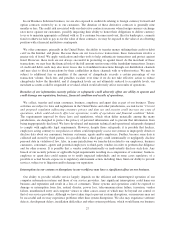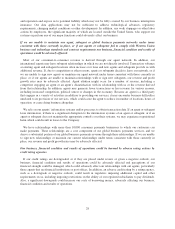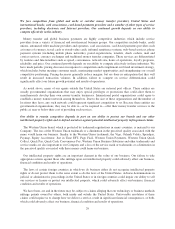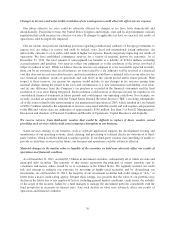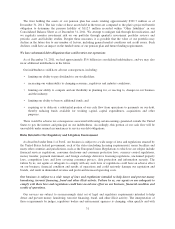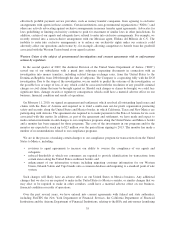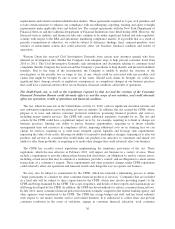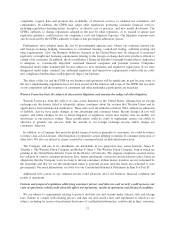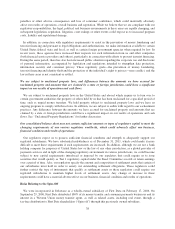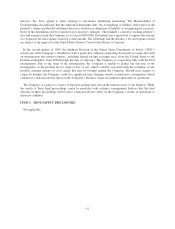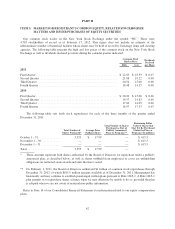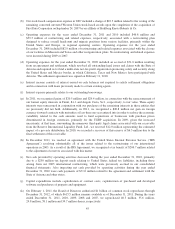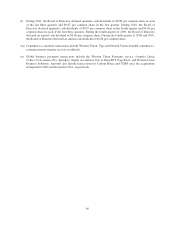Western Union 2011 Annual Report Download - page 43
Download and view the complete annual report
Please find page 43 of the 2011 Western Union annual report below. You can navigate through the pages in the report by either clicking on the pages listed below, or by using the keyword search tool below to find specific information within the annual report.requirements and related consumer identification matters. These agreements required us to pay civil penalties and
to take certain measures to enhance our compliance with recordkeeping, reporting, training and agent oversight
requirements under applicable state and federal law. The consent agreements with the New York Department of
Financial Services and the California Department of Financial Institutions were lifted during 2008. However, the
financial services industry and businesses like ours continue to be under significant federal and state regulatory
scrutiny with respect to the BSA and anti-money laundering compliance matters. It is possible that as a result of
periodic examinations or otherwise, we could be subject to deficiency findings, fines, criminal penalties, asset
seizures or enforcement actions that could adversely affect our business, financial condition and results of
operations.
Western Union has received Civil Investigative Demands from certain state attorneys general who have
initiated an investigation into whether the Company took adequate steps to help prevent consumer fraud from
2010 to 2011. The Civil Investigative Demands seek information and documents relating to consumer fraud
complaints that the Company has received and the Company’s procedures to help identify and prevent fraudulent
transfers. Due to the stage of the investigation, the Company is unable to predict the outcome of the
investigation, or the possible loss or range of loss, if any, which could be associated with any possible civil
claims that might be brought by one or more of the states. Should such claims be brought, we could face
significant fines, damage awards, or regulatory consequences, or compulsory changes in our business practices
that could have a material adverse effect on our business, financial condition, and results of operations.
The Dodd-Frank Act, as well as the regulations required by that Act and the creation of the Consumer
Financial Protection Bureau could adversely affect us and the scope of our activities, and could adversely
affect our operations, results of operations and financial condition.
The Act, which became law in the United States on July 21, 2010, calls for significant structural reforms and
new substantive regulation across the financial services industry. In addition, the Act created the CFPB, whose
purpose is to issue and enforce consumer protection initiatives governing financial products and services,
including money transfer services. The CFPB will create additional regulatory oversight for us. The Act and
actions by the CFPB could have a significant impact on us by, for example, requiring us to limit or change our
business practices, limiting our ability to pursue business opportunities, requiring us to invest valuable
management time and resources in compliance efforts, imposing additional costs on us, limiting fees we can
charge for services, requiring us to meet more stringent capital, liquidity and leverage ratio requirements,
impacting the value of our assets, delaying our ability to respond to marketplace changes, requiring us to alter our
products and services in a manner that would make our products less attractive to consumers and impair our
ability to offer them profitably, or requiring us to make other changes that could adversely affect our business.
The CFPB has recently issued regulations implementing the remittance provisions of the Act. These
regulations, which become effective in February 2013, will impact our business in a variety of areas. These
include a requirement to provide enhanced pre-transaction disclosures; an obligation to resolve various errors,
including certain errors that may be outside of a remittance provider’s control; and an obligation to cancel certain
transactions at a consumer’s request. These requirements and other potential changes under CFPB regulations
could adversely affect our operations and financial results and change the way we operate our business.
We may also be subject to examination by the CFPB, which has initiated a rulemaking process to define
“larger participants of a market for other consumer financial products or services.” Companies that are included
in a final rule will be subject to direct supervision by the CFPB, which may involve providing reports to the
CFPB and being examined by the CFPB. The scope, frequency, and details of these reports and examinations are
still being developed by the CFPB. In addition, the CFPB has broad authority to enforce consumer financial laws.
In July 2011, many consumer financial protection functions formerly assigned to the federal banking agency and
other agencies were transferred to the CFPB. The CFPB has a large budget and staff, and has broad authority
with respect to our money transfer service and related business. It is authorized to collect fines and provide
consumer restitution in the event of violations, engage in consumer financial education, track consumer
36



